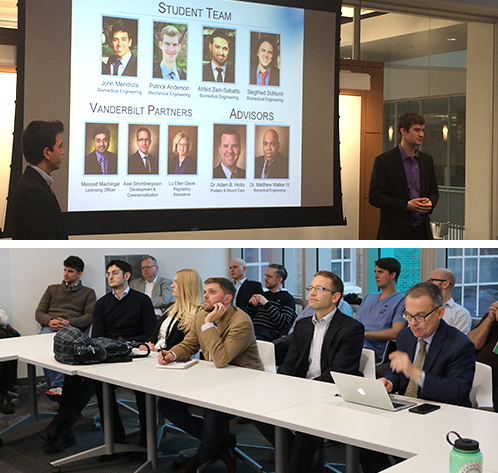
Four Vanderbilt student teams participated in the IMPACT courses (Initiating, Maximizing, Promoting and Accelerating Commercialization and Translations) for medical device entrepreneurs.
Students worked in small teams to explore a medical device technology from all angles, including intellectual property issues, customer discovery and minimum viable product considerations, market evaluation, FDA regulatory pathways, securing capital, and the practicalities of setting up and running a small business. The course covered elements of the Stanford Lean Launchpad model (used in the NSF I-Corps program) as well as additional medical device-specific considerations. The course was highly interactive and hands-on, with substantial time for discussion and student presentations, and a number of experienced guest lecturers. By the end of the semester, students were positioned to determine whether a startup company made sense for their team’s technology, as well as understanding the basics of medical device entrepreneurship.
For the final, students pitched their companies to an audience of engineering and medical professors, fellow graduate students, physicians and nurses, and fielded tough questions about devices.
The four teams were:
- PathEx, biomedical engineering PhD student Sinead Miller and mechanical engineering PhD student Frederico Campisano. Created a device that treats the root cause of sepsis by removing bacteria and endotoxins from the blood.
- LumaSil, biomedical engineering master’s student John Mendoza (BE’16) and mechanical engineering PhD student Patrick Anderson. Provides blue and infrared light treatment for chronic diabetic wounds.
- SpineX, mechanical engineering PhD students Matthew Yandell and Erik Lamers. Created a $200 fabric exoskeleton worn beneath scrubs to help nurses with safe lifting.
- KickIt Health, undergraduate Kevin Cyr (ES’17) mechanical engineering PhD student Patrick Wellborn. Redesigned the IV stand for more base stability and to encourage early mobilization with a support bar.
The IMPACT instructors were Bob Webster from the Department of Mechanical Engineering, Byron Smith, an alumnus and founder of EndoInSight Inc., and Chris Harris, CTTC Director of Licensing.




